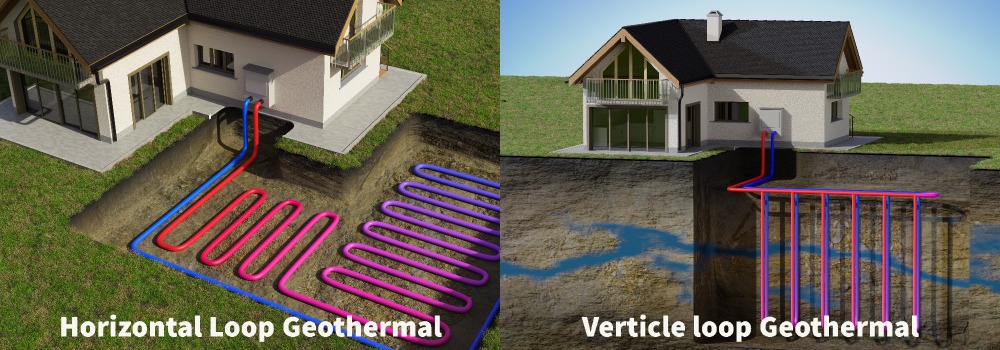
HOW GEOTHERMAL HEATING AND COOLING WORKS FOR YOUR HOME!
Geothermal heating and cooling systems use the natural heat stored in the ground to regulate the temperature in your home. Here's a more detailed explanation of how it works:
- Ground Loop System: The system utilizes a network of pipes, known as a "ground loop," that is buried in the ground near your home. This loop is typically made of high-density polyethylene and contains a mixture of water and antifreeze solution.
- Heat Exchange: In winter, when you want to heat your home, the geothermal system extracts heat from the ground through the ground loop. The ground remains at a relatively constant temperature, typically between 50-60 degrees Fahrenheit (10-15 degrees Celsius), regardless of the air temperature above.
- Heat Pump: The extracted heat is transferred to a heat pump located inside your home. The heat pump contains a refrigerant that absorbs the heat from the ground loop and evaporates, becoming a gas.
- Heat Distribution: The heated refrigerant gas is compressed by the heat pump, which increases its temperature even further. This hot gas then circulates through a coil system, where it transfers its heat to the air or water that will be distributed throughout your home.
- Heating Your Home: The warm air or water is then distributed throughout your home using a ductwork system or radiant floor heating, providing warmth to your living spaces.
During the summer, the process is reversed for cooling your home:
- Heat Extraction: The geothermal system extracts heat from the indoor air or water in your home using the same heat pump. This heat is transferred to the refrigerant gas, which absorbs it.
- Heat Dissipation: The refrigerant gas is then compressed, raising its temperature even more. The hot gas releases its heat energy to the ground loop system, which acts as a heat sink.
- Cooling Your Home: The cooled air or water is distributed through your home, removing heat and providing a comfortable indoor temperature.
The efficiency of geothermal systems stems from their ability to transfer heat rather than generate it. By utilizing the relatively stable temperature of the Earth, geothermal heating and cooling systems can achieve higher energy efficiency compared to traditional heating and cooling methods, which rely on burning fossil fuels. This makes geothermal systems a more environmentally friendly and cost-effective solution for heating and cooling your home.
- Horizontal Loop: Pipes are buried in a horizontal trench, circulating a heat transfer fluid to absorb or release heat from the ground. Common in residential installations with sufficient land area.
- Vertical Loop: Boreholes are drilled vertically, and U-shaped pipes are inserted into them. Heat transfer fluid circulates in the pipes, transferring heat to or from the ground. Suitable for limited land areas or challenging soil conditions, often used in commercial installations.
Both systems utilize ground temperature for heating and cooling, working with a geothermal heat pump to exchange heat with the building. The choice depends on factors like available space, soil conditions, and installation costs. The expert geothermal technicians at Jacks Heating and Cooling can tell you what will work for your home.
Advantages of Geothermal Systems:
- Can be used to heat and cool your home: Geothermal systems can provide both heating and cooling for residential buildings, offering versatility in climate control.
- 25% to 50% less electricity than conventional heating or cooling systems: Geothermal systems are known for their high energy efficiency, typically consuming less electricity compared to traditional heating or cooling systems.
- Comfortable—Constant, even comfort with no hot or cold spots: Geothermal systems distribute heat or cool air evenly throughout the space, minimizing temperature variations and creating a more comfortable indoor environment.
- Extremely efficient operation: Geothermal systems leverage the constant temperature of the earth to facilitate heating or cooling, resulting in highly efficient operation and energy savings.
- Geothermal uses renewable energy: Geothermal systems utilize the earth's heat, which is a renewable energy source, making them more sustainable and environmentally friendly.
- Safe and clean—No flame, no combustion, no odors; just safe, reliable operation year after year: Geothermal systems do not rely on combustion processes, eliminating the risks associated with flames and the potential for odors or emissions. They are known for their reliable and safe operation.
- Geothermal systems have long equipment life (20 years and more): year life expectancy for the heat pump itself and 25 to 50 years for the underground infrastructure.
- Low maintenance (for a closed-loop ground loop): Geothermal systems, particularly those with closed-loop ground loops, require minimal maintenance once installed properly. Regular check-ups and inspections are recommended to ensure optimal performance.
- No noisy outdoor units such as you would find with standard AC: Geothermal systems typically have a quieter operation because the majority of the equipment is installed indoors or underground, minimizing outdoor noise levels.
- 30% Federal Tax credit. Additionally, certain power companies may offer rebates or incentives to encourage the adoption of geothermal technology.
Call the expert geothermal technicians at Jacks Heating and Cooling for a quote on a quality customized installation of a geothermal heat pump system, today!
Request Quote